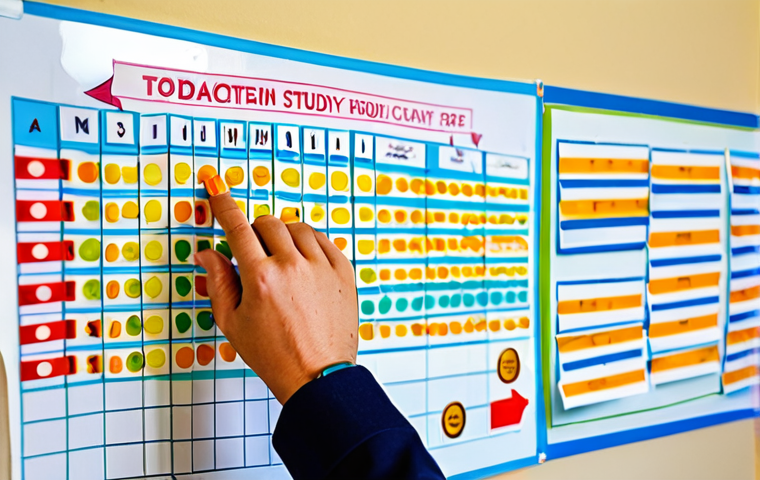So, you’re thinking about tackling the real estate licensing exam, huh? I get it. It’s a beast!
I remember feeling totally overwhelmed at the beginning. One thing that really helped me, and that I’m seeing a lot of other people finding success with these days, is forming a study group.
It can provide that crucial support system and a place to clarify all those tricky concepts. Plus, with the way the market’s going and the increasing demand for knowledgeable real estate agents, nailing this exam is more important than ever.
We can improve efficiency by leveraging the recent advances in study techniques. Let’s dig in deeper to see how a study group can seriously boost your chances of acing that exam.
Okay, let’s dive in and get this blog post fired up!
Embracing Shared Knowledge: Why Study Groups Are a Game-Changer

Let’s face it, preparing for the real estate exam can feel like you’re drowning in a sea of jargon and complex regulations. It’s not just about memorizing facts; it’s about understanding how they all connect and applying that knowledge to real-world scenarios.
This is where a study group really shines. It’s not just about passively absorbing information; it’s about actively engaging with the material, questioning assumptions, and teaching each other.
I remember one time when I was totally stumped on the concept of depreciation. It just wasn’t clicking. But when I explained it to someone else in my study group, suddenly it made sense to me too!
We were able to apply it in real world examples and that helped a lot. That collaborative environment is invaluable. You’re forced to articulate your understanding, which solidifies your own learning, and you benefit from the diverse perspectives of others.
And honestly, knowing that you’re not alone in the struggle can be a huge morale booster.
Tackling Tricky Topics Together
Leveraging Diverse Strengths
Beyond the Books: Applying Knowledge in Realistic Scenarios
The real estate exam isn’t just a test of your memory; it’s a test of your ability to apply what you’ve learned to practical situations. A study group can help you bridge the gap between theory and practice by working through case studies, role-playing client interactions, and analyzing real estate transactions.
I remember one particular study session where we spent hours dissecting a complex purchase agreement. We each took on different roles – buyer, seller, agent, attorney – and walked through the entire process step-by-step.
It was incredibly helpful in solidifying our understanding of the legal and ethical considerations involved in a real estate transaction. Moreover, practicing those skills really helped to prepare me for the field, too.
Case Studies and Role-Playing
Analyzing Real Transactions
Staying on Track: Structure and Accountability
Let’s be real, studying for the real estate exam requires discipline and consistency. It’s easy to procrastinate or get sidetracked, especially when you’re juggling other commitments.
A study group can provide the structure and accountability you need to stay on track. By setting regular meeting times, assigning tasks, and tracking progress, you’re creating a built-in support system that keeps you motivated and focused.
Plus, knowing that you’re expected to contribute to the group can be a powerful incentive to keep up with your studies. We had a chart and would put stickers up for completing milestones and it really helped, actually.
I know that sounds a little silly but we were able to keep track of our progress and celebrate small wins.
Setting Goals and Deadlines
Regular Check-ins and Progress Tracking
Unlocking Different Learning Styles: Tailoring Your Approach
Everyone learns differently. Some people are visual learners, others are auditory learners, and still others are kinesthetic learners. A study group allows you to tap into different learning styles and find the methods that work best for you.
Maybe you learn best by listening to lectures, while your study buddy prefers to create flashcards or draw diagrams. By sharing your learning strategies and experimenting with different approaches, you can discover new ways to absorb and retain information.
The more people in your group, the more ways to prepare!
Visual Aids and Flashcards
Interactive Discussions and Debates
The Power of Peer Support: Boosting Confidence and Reducing Stress
Preparing for the real estate exam can be stressful and overwhelming. Doubts and anxieties can creep in, undermining your confidence and motivation. A study group provides a safe space to share your fears, ask questions, and receive encouragement from your peers.
Knowing that others are facing the same challenges can be incredibly reassuring. The constant encouragement and confidence boosts really help you get through all of the information that needs to be covered.
Sharing Experiences and Concerns
Celebrating Successes Together
Mastering Key Concepts: A Structured Approach
To ensure that your study group is effective, it’s important to have a structured approach to mastering key concepts. This involves breaking down the exam content into manageable chunks, identifying the most important topics, and allocating time for focused study.
You can use a study guide, a textbook, or online resources to guide your learning. Within the group, be sure to clarify and ask any questions!
Creating a Study Schedule
Identifying Key Topics
Resources for Success: Tools to Help You Ace the Exam
There’s a whole arsenal of resources out there to help you prep for the real estate licensing exam.
| Resource Type | Description | Benefits |
|---|---|---|
| Online Practice Exams | Simulate the real exam environment with timed questions. | Identifies weak areas, improves test-taking speed and accuracy. |
| Study Guides and Textbooks | Comprehensive overviews of all exam topics. | Provides in-depth knowledge, clarifies complex concepts. |
| Flashcards | Portable, quick review of key terms and definitions. | Reinforces memory, ideal for on-the-go learning. |
| Video Courses | Visual and auditory learning through instructor-led sessions. | Engaging, caters to different learning styles, offers expert insights. |
Choosing the Right Materials
Utilizing Online Resources
Tackling Tricky Topics Together
Study groups are especially helpful when it comes to those tricky topics that seem impossible to grasp on your own. Whether it’s understanding the nuances of property law or deciphering complex financial calculations, a study group provides a forum for asking questions, sharing insights, and working through problems together.
If someone in the group has a solid understanding of a particular concept, they can explain it in a way that resonates with others. And if everyone is struggling with the same issue, you can brainstorm together and find creative solutions.
For example, if the topic is easements, you can analyze hypothetical situations and determine how different types of easements would affect property rights.
One particular thing that my group did was to create memory acronyms to help us remember rules and it made all the difference!
Leveraging Diverse Strengths
One of the great things about study groups is that everyone brings their own unique strengths and perspectives to the table. Some people are naturally good at memorizing facts and figures, while others are better at understanding the underlying principles.
By leveraging each other’s strengths, you can create a well-rounded understanding of the material. For example, if you’re struggling with math calculations, you can partner with someone who is a whiz at numbers.
They can help you understand the formulas and practice problems until you feel confident. On the other hand, if you’re strong on legal concepts, you can help others understand the legal implications of different real estate transactions.
In Conclusion
Forming a study group can be a pivotal step in preparing for the real estate exam. By collaborating with peers, you gain diverse perspectives, share knowledge, and reinforce your understanding of complex concepts.
Beyond academics, study groups provide essential peer support, reducing stress and boosting confidence. Ultimately, this collaborative approach will increase your chances of success, not just on the exam but in your future real estate career.
Need-to-Know Info
1. Join Local Real Estate Associations: Attend meetings, workshops, and networking events to stay updated on local market trends and regulations. Many offer courses for licensing and additional skill-building.
2. Use Regional MLS (Multiple Listing Service): Familiarize yourself with the MLS system in your area. It’s the primary tool for finding properties, comparing prices, and accessing market data.
3. Study Local Real Estate Laws: Real estate laws vary by state and sometimes by city. Make sure you have a solid understanding of the specific laws governing real estate transactions in your area.
4. Shadow Experienced Agents: Reach out to established real estate agents in your community and ask if you can shadow them for a day or two. This hands-on experience can provide invaluable insights into the day-to-day realities of the job.
5. Network with Local Professionals: Build relationships with local lenders, appraisers, home inspectors, and other professionals involved in real estate transactions. These connections can be a valuable source of referrals and support.
Key Takeaways
* Collaborative Learning: Study groups foster a collaborative environment where knowledge is shared and reinforced. * Practical Application: They help bridge the gap between theory and practice through case studies and role-playing.
* Accountability: They provide structure and accountability to keep you on track with your studies. * Diverse Learning Styles: They allow you to tap into different learning styles and find the methods that work best for you.
* Peer Support: They offer a safe space to share fears, ask questions, and receive encouragement from your peers.
Frequently Asked Questions (FAQ) 📖
Q: Okay, I get the general idea, but how exactly does a study group make a difference? I’m already swamped with coursework and practice tests.
A: Trust me, I felt the same way! But think of it this way: You’re not alone in struggling with certain topics. A study group is a chance to learn from others who do understand those concepts, and vice versa.
When I was studying, I was terrible with property law, but I was a whiz at finance. My study buddies helped me nail down the legal stuff, and I, in turn, helped them understand things like mortgage-backed securities.
It’s about diverse perspectives and filling in knowledge gaps collectively. Plus, explaining a concept out loud reinforces your own understanding – it’s a win-win!
Think of it as a collaborative brain! And let’s be real, misery loves company. Knowing other people are in the same boat can be hugely motivating on those days you feel like giving up.
Q: Sounds good in theory, but what if everyone in the group is at different levels? I don’t want to get dragged down or feel like I’m holding others back.
A: That’s a valid concern! It’s all about smart group formation. First, aim for a group with diverse strengths, as I mentioned.
Second, be upfront about your own strengths and weaknesses. A good group will adapt to everyone’s needs. Maybe you dedicate certain sessions to specific topics where one person takes the lead on teaching.
Or, if you’re feeling behind, you can schedule extra sessions with the group members who are stronger in those areas. The point is communication. Don’t be afraid to ask for help, and don’t be afraid to offer it either.
Also, don’t be afraid to suggest breaking into smaller subgroups based on learning pace or subject area if the whole group dynamic isn’t working. Adaptability is key!
Q: Alright, I’m convinced. But how do I even find people to study with? I’m not exactly known for my networking skills.
A: No sweat! Start with your real estate licensing class. Reach out to people you connect with during lectures or online forums.
Local real estate associations often have student groups or mentorship programs too. Check out online forums and groups dedicated to real estate exam prep – Facebook groups and Reddit are goldmines!
When you reach out, be specific about what you’re looking for in a study group. Mention the exam you’re prepping for, your study style (e.g., prefer structured sessions or more informal discussions), and what you hope to get out of the group.
Don’t be discouraged if the first group you join isn’t a perfect fit. It might take some trial and error to find the right dynamic, but trust me, it’s worth the effort.
And hey, even if you don’t end up with a lifelong study buddy, you’ll at least expand your network and learn some valuable tips along the way! Think of it as practicing your networking for your future career!
📚 References
Wikipedia Encyclopedia






